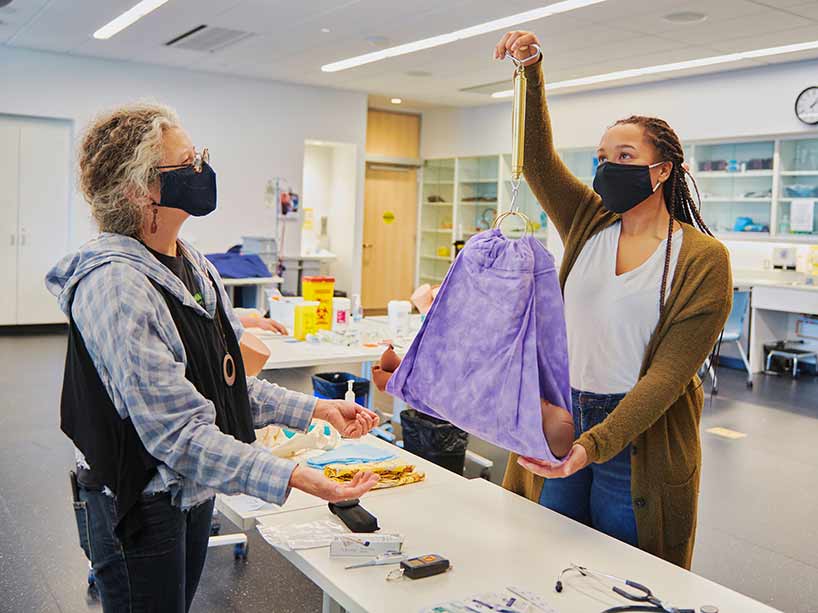Re-imagining experiential learning

Midwifery student Hannah Cole practising in the lab (right) with professor Nicole Bennett: the program is one of many at Ryerson that offers hands-on learning in class and in the community. Photo by Alyssa K. Faoro.
From co-ops at Defence Research & Development Canada and the Region of Peel to practising client care through virtual hospital simulations, the experiential learning opportunities available at Ryerson are endless. Through experiential learning at Ryerson, students become career-ready, community ready and citizen ready, taking on the rapidly changing world as we know it.
“There are no walls between us and the city, like a traditional ivory tower university would have. Being fully embedded within the city of Toronto allows us to have more meaningful, reflective, critical thinking moments that can both challenge and encourage our own approaches,” says Anita Abraham, director of Experiential Learning at Ryerson. “It means we’re more willing to confront some of the tensions of the world, look at our work through an equity and intersectional lens and learn to balance community needs with our own institutional needs. There’s no other learning opportunity like it.”
A forward thinking mindset
Numerous faculties and programs at Ryerson have integrated experiential learning into their curriculum in some capacity. Through Supercourses, field education, live actor simulation and much more, new ways to participate in experiential learning are becoming available to students. Though the pandemic shifted many in-person opportunities to virtual formats, Abraham says this experience is helping students prepare for what the world might be in the future, as well as what’s being currently asked of them. “The pandemic has reiterated and inspired us for what we need to be continuing to educate for,” says Abraham. “Toronto looked extremely different six months ago and it will look different six months from now. Ryerson students can be an integral part of reimagining the future and there’s no greater learning through experience than being part of that reimagination.”
This forward thinking mindset is also seen in the types of experiential learning partnerships Ryerson has forged over the years with organizations such as Facebook and St. Michael’s Hospital. Through these relationships and the way Toronto has responded to the pandemic, the Experiential Learning hub, faculty and students are seeing a shift in what skills and type of student the workplace and world is looking for: young people who have critical thinking skills, empathy, who are strong communicators and know how to respond to conflict.
In the end, competencies, mindsets and building resilience remain extremely important. “It’s not just the what, it’s the how,” says Abraham. “How students are able to learn through the kinds of opportunities they get, the reflection on the learning that occurs and how you’re being equipped for a truly ever changing job landscape.”
So what’s the future of experiential learning during a pandemic? “We see experiential learning continuing to be a core defining aspect of what Ryerson does,” says Abraham. “It’s been a hallmark of our history and it will be a hallmark of our future. Together as an institution we need to equip students to have conversations and be advocates for things that are neglected in our world. Ryerson is a university that does things that other people are afraid to do and experiential learning is one of the ways we equip our students to be unapologetically bold. Experiential learning is a real strategy to ensure that our students are prepared and supported to be the kind of changemakers this world needs.”
Many learning opportunities
The Experiential Learning unit within the Centre for Excellence in Learning and Teaching defines itself as a hub because of how interdisciplinary and interconnected their work is. “We respond to things like institutional risk, how as an institution we align and respond to gaps that might exist in regards to communication, accountability, or where resources are shared,” says Abraham.
This was evident in the hub’s response to providing coordinated oversight to experiential learning activities as the university prepared for the unprecedented fall 2020 semester. The hub developed a framework that supported faculties and units as they implemented their experiential learning activities, remotely and/or face-to-face, with students, both on and off campus.
In addition to the framework, throughout the fall semester, the hub continually provided informed direction, concrete information and ongoing support to faculty and staff through their Community of Practice sessions, ELevator Chats and one-on-one consults. “We hope through being that decentralized coordinating body, faculty and staff can spend less time responding to the institutional gaps and invest a greater amount of their energy into supporting students and external partners in developing, implementing and evaluating exceptional experiential learning experiences” says Abraham.
Next steps
In addition to creating a foundation of support for faculty, the Experiential Learning hub is also thinking about what’s next. “Our role is about growth, strategic vision, and thought leadership. We don’t tell people to fit into a box, we inspire where we might all be going together,” says Abraham. “We want to help elevate or align great ideas with what Ryerson is doing within the Academic Plan, and then take it to whatever level they want to take it.”
Though many other universities have created strict definitions of what constitutes internships, placements, and co-ops, at Ryerson experiential learning doesn’t fit within a single box. “Experiential learning can take a multitude of approaches as long as it has clear learning outcomes, curated experiences, intentional integration, reflection and assessment,” says Abraham. In other words, the possibilities are endless, especially thanks to the Ryerson campus’ urban location.
This is one in a series of stories about Ryerson’s Centre for Excellence in Learning and Teaching. The centre is dedicated to big thinking about curriculum, pedagogy and creative ways to develop inclusive teaching practices that enrich the student learning experience. To find out more, visit the Centre for Excellence in Learning and Teaching.
Related stories: